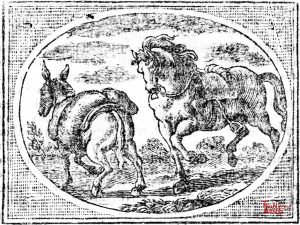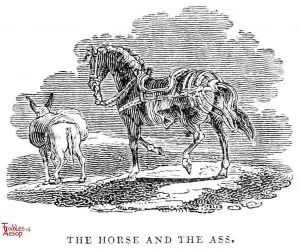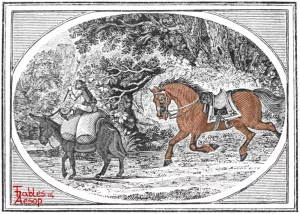A Horse met an Ass on the road and demanded he move aside. The Ass complied but was delighted later to find the horse lame and abused along the same road.
Better humble security than gilded danger.
[These versions are not exactly the same fable, but are similar enough to be included on the same page.]

Eliot/Jacobs Version
A Horse and an Ass were travelling together, the Horse prancing along in its fine trappings, the Ass carrying with difficulty the heavy weight in its panniers. “I wish I were you,” sighed the Ass; “nothing to do and well fed, and all that fine harness upon you.” Next day, however, there was a great battle, and the Horse was wounded to death in the final charge of the day. His friend, the Ass, happened to pass by shortly afterwards and found him on the point of death. “I was wrong,” said the Ass: “Better humble security than gilded danger.”

Townsend version
A horse, proud of his fine trappings, met an Ass on the highway. The Ass, being heavily laden, moved slowly out of the way. “Hardly,” said the Horse, “can I resist kicking you with my heels.” The Ass held his peace, and made only a silent appeal to the justice of the gods. Not long afterwards the Horse, having become broken-winded, was sent by his owner to the farm. The Ass, seeing him drawing a dungcart, thus derided him: “Where, O boaster, are now all thy gay trappings, thou who are thyself reduced to the condition you so lately treated with contempt?’

JBR Collection
A War-Horse, gaily caparisoned, with arching neck and lofty tread, the ground ringing beneath his hoofs, overtook a patient Ass, slowly walking along under a heavy load. He called upon him in a haughty tone to move on one side, and give him room to pass. The poor Ass did so, sighing at the inequality of their lots. Not long after, he met the same Horse in the same road, and near the same spot; but in how different circumstances! Wounded in battle, and his master killed, he was now lame, half blind, and heavily laden, driven with many blows by a brutal carrier, into whose hands he had fallen.

Samuel Croxall
THE Horse, adorned with his great war-saddle, and champing his foaming bridle, came thundering along the way, and made the mountains echo with his loud shrill neighing. He had not gone far, before he overtook an Ass, who was labouring under a heavy burden, and moving slowly on in the same track with himself. Immediately he called out to him, in a haughty, imperious tone, and threatened to trample him in the dirt, if he did not break the way for him. The poor, patient Ass, not daring to dispute the matter, quietly got out of his way, as fast as he could, and let him go by. Not long after this, the same Horse, in an engagement with the enemy, happened to be shot in the eye, Which made him unfit for show, or any military business; so he was stript of his fine ornaments, and sold to a carrier. The Ass, meeting him in this forlorn condition, thought that now it was his time to insult; and so, says he, Hey-day, friend, is it you! Well, I always believed that pride of yours would one day have a fall.
THE APPLICATION
Pride is a very unaccountable vice: many people fall into it unawares, and are often led into it hy motives, which, if they considered things rightly, would make them abhor the very thoughts of it. There is no man that thinks well of himself, but desires that the rest of the world should think so too. Now it is the wrong measures we take in endeavouring after this, that expose us to discerning people in that light which they call pride, and which is so far from giving us any advantage in their esteem, that it renders us despicable and ridiculous. It is an affectation of appearing considerable that puts men upon being proud and insolent; and their very being so, makes them, infallibly, little and inconsiderable. The man that claims and calls for reverence and respect, deserves none; he that asks for applause, is sure to lose it; the certain way to get it is to seem to shun it; and the humble man, according to the maxims even of this world, is the most likely to be exalted. He that, in his words or actions, pleads for superiority, and rather chuses to do an ill action, than condescend to do a good one, acts like a horse, and is as void of reason and understanding. The rich and the powerful want nothing but the love and esteem of mankind to complete their felicity; and these they are sure to obtain by a good-humoured, kind condescension; and as certain of being every body’s aversion, while the least tincture of overbearing rudeness is perceptible in their words or actions. What brutal tempers must they be of, who can be easy and indifferent, while they know themselves to be universally hated, though in the midst of affluence and power? But this is not all; for if ever the wheel of fortune should whirl them from the top to the bottom, instead of friendship or commiseration, they will meet with nothing but contempt; and that with much more justice than ever they themselves exerted it towards others.

Thomas Bewick (The Horse and The Ass)
The Horse, adorned with his great war-saddle, and champing his foaming bridle, came thundering along the high-way, and made the mountains echo with his neighing. He had not gone far before he overtook an Ass, who was labouring under a heavy burthen, and moving slowly on in the same track. In an imperious tone he threatened to trample him in the dirt, if he did not get out of the way. The poor Ass, not daring to dispute, quietly got aside as fast as he could, and let him go by. Not long after this, the same Horse, in an engagement, happened to be shot in the eye, which made him unfit for show, or any military business, so he was stripped of his ornaments, and sold to a carrier. The Ass meeting him in this forlorn condition, thought that now it was his time to retort: Hey-day, friend, says he, is it you! Well, I always believed that pride of your’s would one day have a fall.
APPLICATION.
It is an affectation of appearing considerable, that puts men upon being proud and insolent; but this very affectation infallibly makes them appear little and despicable in the eyes of discerning people. Did the proud man but rightly consider what kind of ingredients pride is composed of and fed with, and the unstable foundation, and the tottering pinnacle upon which it stands, he would blush at the thoughts of it, and cease to be puffed up by the little supernumerary advantages, whether of birth, fortune, or title, which he may enjoy above his neighbours. These might indeed be a blessing to him, and to the community in which he lives, if wisely used; but if guided by pride, and consequently by want of sense, they will prove only a curse; and the reverence and respect which he looks for, will not be paid with sincerity, nor does he deserve it; and should the tide of misfortune set in against him, instead of friendship and commiseration, he will meet with nothing but contempt, and that with much more justice than ever he himself expressed it towards others. The vain proud man ought to be put in mind, that the time is not far distant, when his skull will not be distinguished from that of the beggar; and that there is no state, however exalted, so permanent, that it may not be reduced to a level with the lowest.

L’Estrange version
In the days of old, when horses spoke Greek and Latin, and asses made syllogisms, there happen’d an encounter upon the road betwixt a proud pamper’d jade in the full course of his carriere, and a poor creeping ass, under a heavy burden, that had chopt into the same track with him. Why, how now sirrah, says he, d’ye not see by these arms, and trappings, to what master I belong? And d’ye not understand that when I have that master of mine upon my back, the whole weight of the State rests upon my shoulders? Out of the way thou slavish insolent animal, or I’ll tread thee to dirt. The wretched asse immediately slunck aside, with this envious reflexion betwixt his teeth. What would I give to change conditions with that happy creature there. This fancy would not out of the head of him, ’till it was his hap some few days after to see this very horse doing drudgery in a common dung-cart. Why how now friend (says the asse) how comes this about? Only the chance of the war, says the other; I was a soldiers horse, you must know, and my master carry’d me into a battel where I was shot, hack’d, and maim’d; and you have here before your eyes the catastrophe of my fortune.
Moral
The folly, and the fate, of pride and arrogance. The mistake of placing happiness in any thing that may be taken away, and the blessing of freedom in a mean estate.

Equus Superbus et Asinus
Equus phaleris sellaque ornatus cum ingenti hinnitu per viam currebat. Currenti onustus asellus forte obstabat, cui equus, fremebundus, “Quid,” inquit, “ignave, obsistis equo? Cede, inquam, aut te proculcabo pedibus!” Asellus, rudere non ausus, cedit tacitus. Equo provolanti crepat inguen. Tum, cursui inutilis, ornamentis spoliatur. Postea cum carro venientem asinus affatur, “Heus, mi amice! Quis ille ornatus est? Ubi aurea sella? Ubi splendidum frenum? Sic, amice, necesse fuit evenire superbienti.”
Perry #565


